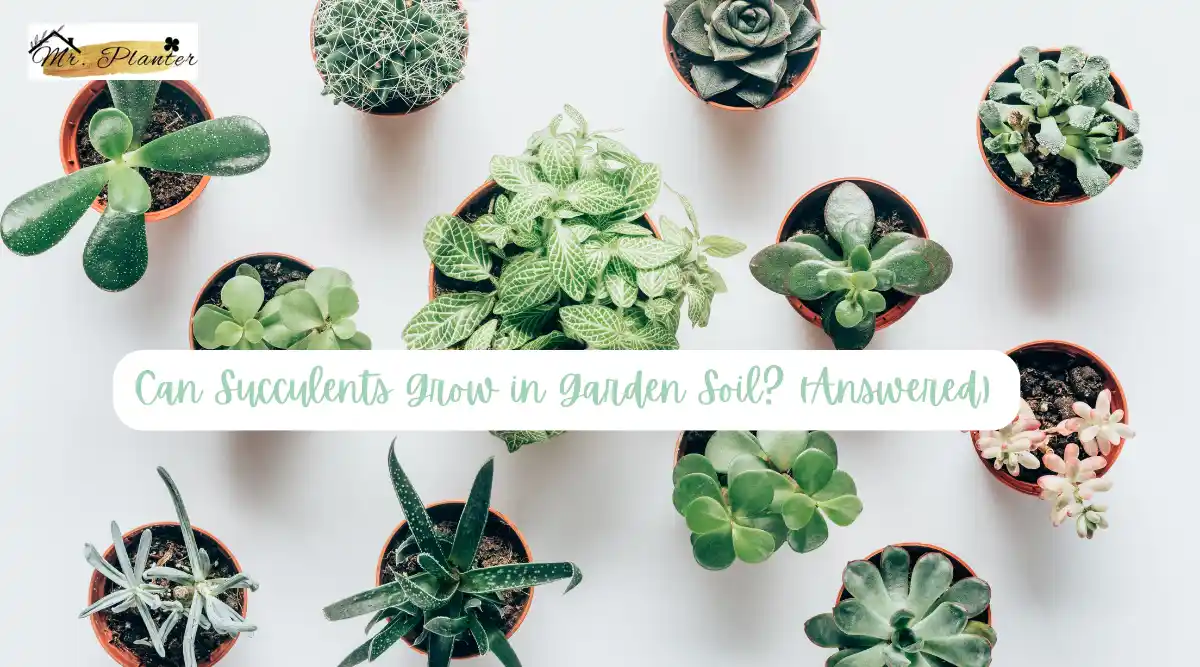Are you a succulent enthusiast who’s always wondered whether these water-storing wonders can thrive in regular garden soil? Look no further!
Succulents have taken the gardening world by storm with their stunning looks and low-maintenance requirements.
But can they truly survive in garden soil? In this article, we’ll delve into the nitty-gritty details of this topic and provide you with valuable insights on whether or not your succulents can grow in garden soil.

So, let’s get digging!
Can Succulents Grow in Garden Soil?
Yes, succulents can grow in garden soil, but it is not ideal for them. Garden soil can be too dense and retain too much moisture, which can lead to root rot and other issues for succulents. Succulents prefer well-draining soil that allows excess water to drain away from their roots.
If you want to plant succulents in garden soil, you can amend the soil with materials like sand, perlite, or gravel to improve drainage.
You can also create raised beds or mounds to improve drainage and prevent water from pooling around the plants.
However, it’s important to note that succulents may still struggle in garden soil, especially in areas with high humidity or heavy rainfall.
For best results, it is recommended to use a well-draining potting mix specifically formulated for succulents.
Growing Succulents in Plain Soil in the Ground vs. Pot
Succulents can be grown in the ground and pots with the right soil conditions. When planting succulents directly in the ground, the type of garden soil plays a crucial role.
Succulents prefer well-draining soil to prevent their roots from sitting in excess water, which can lead to root rot. Regular garden soil can be dense and retain too much moisture, causing problems for these plants.
On the other hand, planting succulents in pots allows for better control over the soil composition.
Potting mixtures for succulents or cacti are readily available at nurseries and gardening centers. These mixes are typically well-draining and provide the ideal environment for succulents to thrive.
Planting Succulents in Soil Based on Climate
The climate in which you live plays a significant role in determining the success of growing succulents in garden soil.
Succulents generally thrive in arid and semi-arid regions with low humidity. If you reside in an area with high rainfall or humidity, planting succulents in regular garden soil may not be the best option.
It is essential to amend the garden soil to improve drainage in humid climates.
Mixing the garden soil with sand, perlite, or pumice can help create a more suitable environment for succulents.
Planting succulents in raised beds can improve drainage and prevent waterlogging.
Succulent Species That Won’t Grow Well in Soil
While many succulent species can adapt to growing in garden soil, some are more challenging to cultivate in this medium.
Certain succulents are native to rocky or sandy habitats and have evolved to thrive in those conditions.
These species may struggle to survive in regular garden soil with poor drainage.
Some examples of succulent species less likely to flourish in garden soil include lithops (living stones), certain euphorbias, and some rare cacti.
If you are determined to grow these specific succulents, creating a specialized soil mixture or planting them in pots is advisable.
Requirements for Succulent Soil
Whether you decide to grow succulents in garden soil or pots, specific requirements for the soil remain consistent across the board. The essential characteristic is excellent drainage to prevent water from stagnating around the roots.
A well-draining succulent soil mix usually consists of three main components: a gritty material, organic matter, and inorganic matter.
- Gritty materials like sand, perlite, or pumice aid in drainage,
- Organic matter like compost or coconut coir provides essential nutrients.
- Inorganic matter, such as vermiculite or crushed gravel, helps to maintain the soil structure and prevent compaction.
Homemade Soil for Growing Succulents
You can create your homemade succulent soil mix if you prefer a more hands-on approach. A simple recipe includes mixing one part coarse sand or perlite, one part regular potting soil, and one part perlite or pumice.
The ratio can be adjusted slightly based on the specific needs of the succulent species you are growing. Remember to sterilize the soil mixture before use to eliminate any potential pathogens.
Baking the soil in the oven at a low temperature (around 180° F or 82° C) for about 30 minutes can help achieve this.
Testing the pH of Succulent Soil
Succulents prefer a slightly acidic to neutral pH range (around 6.0 to 7.0). Before planting your succulents, it is essential to test the soil’s pH level. Home testing kits are readily available at garden centers or online.
If your soil’s pH is outside the ideal range, you can amend it using products like sulfur or lime to adjust the acidity accordingly.
Maintaining the correct pH level is crucial, as extreme acidity or alkalinity can hinder nutrient absorption and affect the overall health of your succulents.
Frequently Asked Questions
Is garden soil Ok for succulents?
Garden soil is generally not recommended for succulents as it tends to retain too much moisture, which can lead to root rot. Succulents require well-draining soil that allows excess water to drain away quickly.
What type of soil is best for succulents?
The best soil for succulents is well-draining, aerating, and loose soil that does not retain too much water. Succulents are prone to root rot and diseases if grown in waterlogged soil, so it is important to use soil that allows excess water to drain away quickly.
How do you prepare a garden bed for succulents?
To prepare a garden bed for succulents, it is important to choose well-draining, aerating, and loose soil that does not retain too much water. One way to achieve this is by mixing coarse sand, perlite, and potting soil in a 1:1:1 ratio. It is also recommended to add a layer of gravel or rocks at the bottom of the bed to improve drainage. Additionally, it is important to choose a sunny location for the garden bed as most succulents require plenty of sunlight to thrive.
Should succulents be in soil or rocks?
Succulents should be planted in well-draining soil rather than rocks. While succulents can survive in rocks alone, they require nutrients from soil to grow properly. Additionally, soil provides a stable environment for the roots to anchor themselves and absorb water and nutrients. Rocks can be used as a top dressing to help with drainage, but should not be used as a sole growing medium for succulents.
Wrapping Up
Succulents can be grown in garden soil. The success of cultivation largely depends on the soil’s drainage properties and the specific needs of the succulent species.
Opting for a well-draining soil mix, whether store-bought or homemade, is crucial to providing the best-growing conditions for these unique and fascinating plants.
By understanding the requirements and making appropriate adjustments based on your climate, you can enjoy a thriving succulent garden that brings joy and beauty to your outdoor space.

